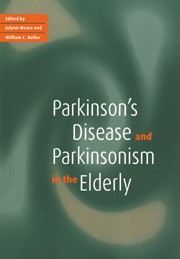Book contents
- Frontmatter
- Contents
- List of contributors
- Foreword
- 1 A glossary of terms
- 2 Diagnosis of parkinsonism in the elderly
- 3 Parkinson's disease and parkinsonism in the elderly
- 4 Drug-induced parkinsonism in the elderly
- 5 Essential tremor in the elderly
- 6 Gait apraxia and multi-infarct states
- 7 The epidemiology of Parkinson's disease and parkinsonism in elderly subjects
- 8 Health and social needs of people with Parkinson's disease and the worldwide organization of their care
- 9 The drug treatment of Parkinson's disease in elderly people
- 10 Rehabilitation in Parkinson's disease and parkinsonism
- 11 Rehabilitation, nursing and elderly patients with Parkinson's disease
- 12 Rehabilitation, physiotherapy and elderly patients with Parkinson's disease
- 13 Rehabilitation, occupational therapy and elderly patients with Parkinson's disease
- 14 Rehabilitation, speech and language therapy and elderly patients with Parkinson's disease
- Index
9 - The drug treatment of Parkinson's disease in elderly people
Published online by Cambridge University Press: 24 November 2009
- Frontmatter
- Contents
- List of contributors
- Foreword
- 1 A glossary of terms
- 2 Diagnosis of parkinsonism in the elderly
- 3 Parkinson's disease and parkinsonism in the elderly
- 4 Drug-induced parkinsonism in the elderly
- 5 Essential tremor in the elderly
- 6 Gait apraxia and multi-infarct states
- 7 The epidemiology of Parkinson's disease and parkinsonism in elderly subjects
- 8 Health and social needs of people with Parkinson's disease and the worldwide organization of their care
- 9 The drug treatment of Parkinson's disease in elderly people
- 10 Rehabilitation in Parkinson's disease and parkinsonism
- 11 Rehabilitation, nursing and elderly patients with Parkinson's disease
- 12 Rehabilitation, physiotherapy and elderly patients with Parkinson's disease
- 13 Rehabilitation, occupational therapy and elderly patients with Parkinson's disease
- 14 Rehabilitation, speech and language therapy and elderly patients with Parkinson's disease
- Index
Summary
Introduction
The goal of medical management of Parkinson's disease (PD) is to control signs and symptoms for as long as possible while minimizing side effects. Medical therapy generally provides good control of symptoms for 4 to 6 years, though disability continues to progress despite best medical management, and many patients develop long-term complications. Such complications include motor fluctuations and dyskinesia associated with long-term levodopa therapy (Chase et al. 1993). Other common causes of disability in late stage disease include postural instability and dementia.
A key consideration in the treatment of elderly patients is that they are more susceptible to side effects from medication. Older people are more likely than younger individuals to be taking more prescribed and over the counter medication for a range of diseases. Medication prescribed for one condition can worsen another and side effects from medication can be mistaken as a new disease process and lead to further unnecessary prescribing (Williamson 1978). Cognitive impairment and delirium, both of which commonly develop as side effects of drug therapy, reduce compliance with drug treatment.
As people live longer the prevalence of PD will increase. PD is a significant risk factor for admission to nursing homes. Over 50% of prevalent cases of PD in one epidemiological study in France were living in nursing homes (Tison et al. 1994). Hallucinations are a particular factor that increases the risk of admission to nursing homes in PD and in many cases this will be related to the drug therapy prescribed for PD (Goetz and Stebbins 1995).
- Type
- Chapter
- Information
- Parkinson's Disease and Parkinsonism in the Elderly , pp. 134 - 164Publisher: Cambridge University PressPrint publication year: 2000



